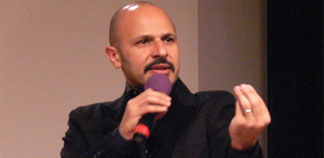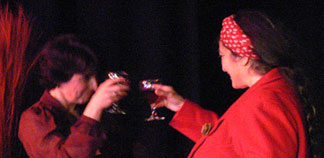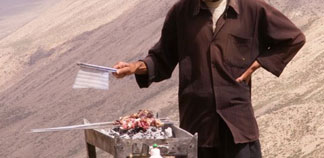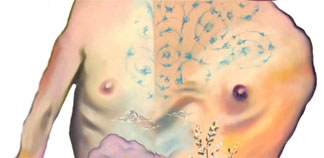به زبان فارسی
PICTORY
LATEST MUSIC
SEARCH
PHOTOGRAPHER
10-Mar-2008 (one comment)
The real breakthrough in Kaveh Golestan’s career as an independent photojournalist occurred during Iran’s 1979 revolution. He was honoured with the Robert Capa Gold Medal in 1979 for his coverage of the Islamic Revolution. His photographs from Ruhollah Khomeini’s arrival in Iran in late January 1979 and first public appearances at the Alavi school in Tehran were published in Time magazine. In the summer of 1979, he travelled to Kurdistan, West Azerbaijan, Khuzestan and Turkmen Sahra in the province of Khorasan and documented the first deadly confrontations between Kurds and Turkmens and the recently established armed forces of the Islamic regime>>>
WORDS
09-Mar-2008 (6 comments)
It was only later, long after the events of 9/11, that I finally realised I was a terrorist. The realization did not come easily, or all at once. After all, I had not planted any bombs or hurt anyone (not even verbally). I had not visited secret training camps in Pakistan . I had not even done anything as rash as Samina Malik, who was convicted of Terrorism recently by a British court for writng Poetry about Jihad. (Poetry has always been a dangerous activity, as all tyrants know). No. It was something far more insidious. >>>
STORY
09-Mar-2008
It was now dusk but still no sign of Hossein. It was completely unlike him to be so late, knowing Mahin would be stranded in the now deserted streets, her hands full of shopping bags from the Bazaar-e-Reza, the market where she had gotten all her spices and nuts, honey and saffron, enough to last for the month. Mahin started walking a bit down the street, hoping she could meet her husband’s oncoming car. Though she walked with her head held high, striding fast and determinedly despite the heavy bags wearing her down, she felt vulnerable. A woman alone at night, walking around as if… as if…>>>
INTERVIEW
07-Mar-2008 (4 comments)
When playwright Sepideh Khosrowjah was two years old her parents gave her a doll, which she immediately destroyed. “Toys were boring,” she says. I can understand why dolls would frustrate a future playwright; there’s nothing inside them. This weekend (March 8,9,14,15,16) Berkeley's Darvag performance company will begin staging Khosrowjah’s Farsi language play, “Dar Soogeh Kazem Ashtari,” (In Memory of Kazem Ashtari) and there is plenty inside the characters [rehearsal photos]. Besides humor, love, cunning, ambition, jealously, shame, and frustration, there is also a surprising secret. It was fun reading the play twice, the second time knowing the characters were hiding something from each other>>>
POETRY
07-Mar-2008 (8 comments)
Holding an armful of lilies
I fly out of the Garden of Eden alone at night to the light
of my own devising, squalling away in a glare, leaving
damned Adam of eye-whites red behind, as the moon soars
on my silvery wings.
POETRY
07-Mar-2008 (3 comments)
If sun were god,
not of everywhere, just here,
how easy it would be
to believe.
How eagerly,
every single morning
we could bask
in its obvious glory. >>>
not of everywhere, just here,
how easy it would be
to believe.
How eagerly,
every single morning
we could bask
in its obvious glory. >>>
FILM
06-Mar-2008 (16 comments)
I'll be the first to admit that my knowledge of Indian films has been limited to Bollywood dance sequences, and over the top acting. This past Saturday that impression was roundly set on it's ear, as I watched what may become my favorite film of the year. Jodhaa Akbar is the epic period piece depicting the Mughal (Turko-Persio-Mongol dynasty) ruler Akbar, who ruled as the Moslem emperor over largely Hindu India during roughly the same era after the Mongolian invasion of Persia.
>>>
STORY
05-Mar-2008
The opium was already starting to lift Ramin up onto a sensual, cottony cloud when he was suddenly yanked back violently to earth. Mandana’ smiling, rosy face had morphed into that of an eye-less, decaying Fati. Fati, the seventh victim. Fati, poor Fati. She was not anonymous anymore. She had been a wife, a mother. Her son, Babak, had stood there staring at Ramin with hate, telling him he was a liar, that his mother was not dead, that she was waiting for him at Kuh Sangi Park. But Fati was dead, and it was up to Ramin to find who had killed her, and the others. Some among his force were already nicknaming her murderer the Spider Killer. A fitting name>>>
YAZD
04-Mar-2008 (26 comments)
On the chest of the central plateau of Iran since more than 3000 years before Christ has stood a defiant warrior called Yasatis. Yasatis or Yazd is an ancient Iranian city that has survived many terrible events amongst them the Mongolian aggression. Although Genghis Khan did tremendous damage to the city and its people, he was not the toughest enemy the city had to face. It was the harsh desert climate surrounding the city that constantly attacking from every direction for thousands of years. People of Yazd are renowned among Iranians as modest and humble people>>>
POETRY
03-Mar-2008
Masjid Soleiman’s summer heat
Highlights sweaty strands
scattered on the wet mud ground
Long red hair
braided
Softly on each shoulder
Home — >>>
Highlights sweaty strands
scattered on the wet mud ground
Long red hair
braided
Softly on each shoulder
Home — >>>
POETRY
01-Mar-2008 (one comment)
Early morning calls are bad news for most
I have been there too, I HAVE been most
But today, you see I receive a call
Frantic and hurried, deserving a big toast
How do I tell you of my fluttering chest?
To be composed through this, to be at my best?
How do I let the world know I’m soaring?
>>>
I have been there too, I HAVE been most
But today, you see I receive a call
Frantic and hurried, deserving a big toast
How do I tell you of my fluttering chest?
To be composed through this, to be at my best?
How do I let the world know I’m soaring?
>>>
SALVATION
29-Feb-2008 (17 comments)
راه نجات، هيچ به جز انقلاب نيست
جز اين، هر آنچه هست به غير از سراب نيست
گفتند انتخاب کن از بين شيخ و شاه
اين هردُوان يکند، نه! اين، انتخاب نيست
چون شد که رفت او و به جايش نشست اين؟
فرزند من مپرس! که ما را جواب نيست
RECENT COMMENTS
IRANIANS OF THE DAY
| Person | About | Day |
|---|---|---|
| نسرین ستوده: زندانی روز | Dec 04 | |
| Saeed Malekpour: Prisoner of the day | Lawyer says death sentence suspended | Dec 03 |
| Majid Tavakoli: Prisoner of the day | Iterview with mother | Dec 02 |
| احسان نراقی: جامعه شناس و نویسنده ۱۳۰۵-۱۳۹۱ | Dec 02 | |
| Nasrin Sotoudeh: Prisoner of the day | 46 days on hunger strike | Dec 01 |
| Nasrin Sotoudeh: Graffiti | In Barcelona | Nov 30 |
| گوهر عشقی: مادر ستار بهشتی | Nov 30 | |
| Abdollah Momeni: Prisoner of the day | Activist denied leave and family visits for 1.5 years | Nov 30 |
| محمد کلالی: یکی از حمله کنندگان به سفارت ایران در برلین | Nov 29 | |
| Habibollah Golparipour: Prisoner of the day | Kurdish Activist on Death Row | Nov 28 |




















